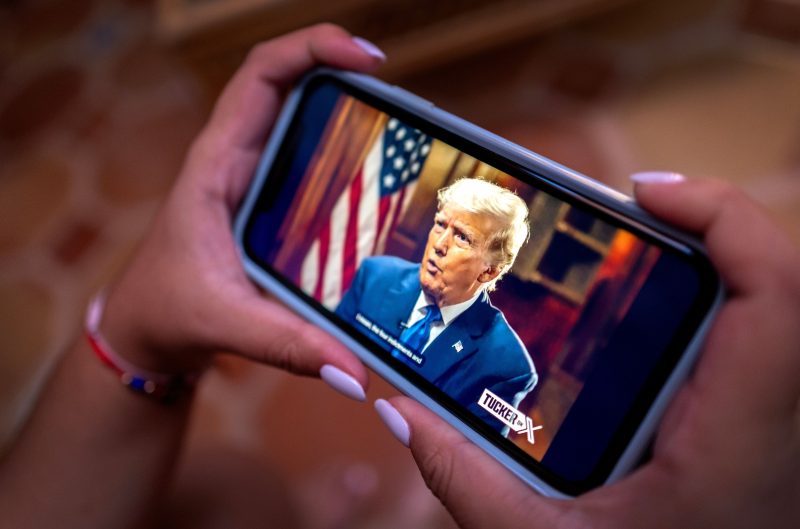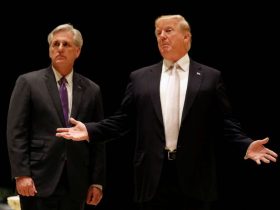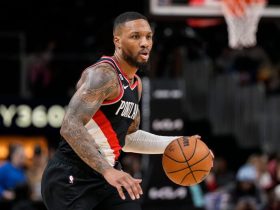If you set aside those occasions in which Tucker Carlson probed for more information in response to something that Donald Trump said, the former Fox News host asked the former president 10 questions during their conversation published on social media Wednesday evening.
That conversation was predicated on the two formers sticking a thumb in the eye of their opponents. Carlson was hoping to peel viewership and clout away from Fox, the channel that was hosting the first Republican presidential debate. Trump was hoping to demonstrate that he was above the whole thing. Carlson’s first question centered on this intent: Why wasn’t Trump at the debate?
The response was what you’d expect, with Trump using the moment to chide Fox News for what he has argued is its unfair treatment of his bid for reelection. Carlson, mustering his well-practiced objective-observer persona, probed a little further: Did Trump “think television is declining?”
Both Carlson, host of “Tucker on X,” (X being the new name for Twitter) and Trump had a reason to suggest that television was on a downslope, of course, at least relative to the sporadic posting of videos on social media. The bigger the thumb, the more damage to the eye. Trump would soon post a performatively amazed comment about the scale of viewership — the interview would “end up with an ‘over 100 Million’ number. Wow!” — though that figure is next to meaningless.
Unquestionably, though, the conversation did (almost necessarily) serve as an antipode to the debate itself. Here was the front-runner for the Republican nomination, a guy who gets more support from Republican primary voters than everyone on that stage combined, engaged in a conversation that one might presume would reveal more about his intentions should he win a second term in 2024. Why wouldn’t people tune in?
That presumption about the conversation, though, would not be manifested. This was Tucker Carlson, after all, so the second prepared question was not about policy or Trump’s various second-term promises. It was, instead: “Do you think [Jeffrey] Epstein killed himself, sincerely?”
Carlson assured Trump and viewers that he was “not a conspiracy person at all,” an assertion at odds with both that question and his broader track record. But there was a reason that one of his 10 unprompted questions centered on the idea that perhaps Epstein was murdered, an action that would require the involvement of authorities.
“The reason I’m asking you is I’m looking at the trajectory since 2015 when you got into politics,” he said. “They started with protests against you, massive protests, organized protests by the left, and then it moved to impeachment twice. And now indictment. I mean, the next stages is violence. Are you worried that they’re going to try and kill you? Why wouldn’t they try and kill you? Honestly.”
Trump, who had not agreed with Carlson’s assessment that Epstein was probably murdered, was quick to describe his opponents as “savage animals.” But, once again, he did not agree with the premise, choosing instead to riff on the Russia investigation and the accuracy of the 2020 election, more familiar terrain.
So, a bit later, Carlson came back to the idea.
“It’s an escalation, is what I’m saying,” Carlson said. “So what’s next? After trying to put you in prison for the rest of your life, that’s not working, so don’t they have to kill you now?”
Trump audibly gulped. He again declined to say that, yeah, they were probably going to try to kill him. Instead, he praised his base for sticking with him despite those indictments, which he described using a colorful colloquialism referring to the feces of a steer.
But, again, this was the thrust of three of Carlson’s 10 questions: Isn’t the government/the elites/whoever going to try to kill you like they probably did Epstein? In the abstract, it’s a bizarre thing to focus on, this beyond-fringe assessment of the response Trump evokes. (After all, it depends on the idea that the indictments are centered on trying to squelch his power and not, you know, that he might have committed crimes.) Coming from Carlson, though, it’s not really surprising at all.
For some time, stretching well back into his tenure at Fox News, Carlson’s presentations were focused on heightening the tension between his viewers (“us”) and the nation’s powerful interests (“them”). He stoked the idea that traditional White Christian conservatives were under threat from all sides — immigrants, the government, medical experts. He cast the nation’s path forward in apocalyptic terms. And so, given an audience with Trump and the audience Trump brings with him, Carlson took the idea of a plot to kill the former president to its extreme.
There were other questions, yes. What did foreign leaders think of President Biden? Whom did Trump hope to run against in November? Even, in his next-to-last question, one about his political goals: If reelected, what would be Trump’s number-one priority?
And then came Carlson’s last question: “Do you think we’re moving towards civil war?”
Trump’s response this time was not reassuring. He noted that there was “tremendous passion, and there’s tremendous love” in the country, then pivoted to praise the crowd who attended his speech outside the White House on Jan. 6, 2021.
“People in that crowd said it was the most beautiful day they’ve ever experienced,” Trump said. He added: “I have never seen such spirit and such passion and such love. And I’ve also never seen, simultaneously, and from the same people, such hatred of what they’ve done to our country.”
Carlson pressed: Was it possible there would be open conflict?
Trump said he didn’t know, adding that “there’s a level of passion that I’ve never seen [and] there’s a level of hatred that I’ve never seen, and that’s probably a bad combination.”
And on that note, the interview ended.
It’s worth noting that the presented video was edited and published by Carlson, meaning that he chose what to show and what, potentially, to omit. When he interviewed the rapper Ye on Fox News last year, he and his team clipped out a number of Ye’s most antisemitic or otherwise alarming comments, since Carlson was hoping to present Ye as a sober critic of the so-called elite and the powerful. Perhaps this interview, too, was crafted with a specific rhetorical outcome in mind.
If so, that outcome was to focus an inordinate amount of attention on the putative risks to Trump personally and to highlight the idea that armed conflict might soon erupt. This was what Carlson chose to accentuate in a conversation that he knew would attract more attention than most of his videos, even if it wasn’t the 100-million-plus listeners that Trump claimed.
This discussion of danger and political violence is what Carlson wanted that fervently pro-Trump audience to hear.








